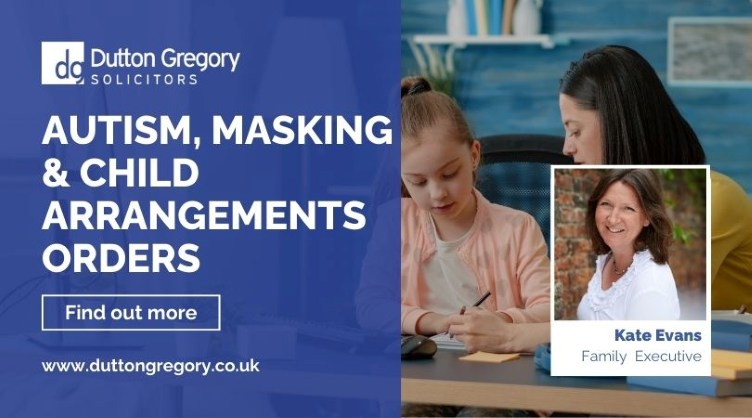Having been involved in two keenly disputed Children Act cases where parents have vastly different experiences of their autistic child, Kate Evans explores the importance of the factors considered when seeking Child Arrangements Orders for children with autism and how it presents itself.
Autistic children may “mask” (hide their feelings and emotions) whilst in less familiar environments and only reveal their true state of mind when they are in a “comfortable or familiar” environment. This can take the form of anger, emotional outbursts, “meltdowns” and unexplained illnesses which are distressing for the child. This may lead to allegations that the child is behaving badly and is “spoilt” by those who do not understand the condition. It can be the case that their difficulties are not apparent in general social situations, at school or in the home of the non-resident parent, meaning that they are only witnessed when the child is in a familiar environment or their primary home. This can make it very difficult to evidence independently.
Neurodiverse children can find change difficult and perceive nuances and differences in their physical environment very differently from non-neurodiverse people. They often find discomfort and overstimulation in things that others would not. A child’s senses; hearing, touch and taste may be heightened in such children and even minor stimuli can become significant issues.
Managing the change between two homes and parenting styles in these cases becomes more difficult and it is important for parents to work together to understand their child and create a smooth transition. Calendars and planners which give the child a visual representation of the arrangements and allowing children to take toys, pictures, clothing between the homes will create a sense of familiarity. It is also helpful to share information regarding food likes and dislikes, favourite stories, bedtime routine etc to maintain a sense of uniformity between the homes.
It can be the case that the child will mask whilst in the care of one parent, meaning that caregiver is largely unaware of the difficulties the child is experiencing. Following return to the other party, however, many days of dis-regulation and unrest may ensue, affecting the child’s schooling, home life, activities and general wellbeing. Because the child does not express these at the time, parents can find themselves at loggerheads as one does not believe that their child would behave in such a way or say such things to the other, leading to allegations of parental alienation - particularly where that child is reluctant to stay with the other parent.
In this type of case, it is important to obtain a formal diagnosis as soon as possible and potentially involve a psychologist or independent Social Worker at an early stage. In the two cases Kate was involved in, the Court appointed a S16(4) Guardian who spoke to the child directly over many months to make a full assessment of the situation and establish the child’s wishes and feelings. The Guardian’s views are key, and the Court is generally guided by their conclusions. However, because a Guardian will not necessarily have specific expertise in autistic children, involving a professional psychologist/autism expert, can be invaluable. They can establish a close and comfortable bond with the child which transcends the making of any Orders and provides continuity for the child long after the Court’s and Guardian’s involvement is at an end.
With ongoing careful intervention, and cooperation between the parties, it is possible to implement a structured and slow progression towards a meaningful contact arrangement guided by the child at the child’s pace. Such an arrangement should not be viewed as “giving in” to the child but rather accepting their neuro-diverse needs in the same way that any physical disability or illness would be taken into consideration. There is not a one size fit all situation and some autistic children are far better than others at adapting and coping. They also go through phases when they can cope and when they cannot. At all stages, flexibility is key.
In all Children Act Cases the welfare of the child is paramount and in families where autism is not recognised or not accepted, Kate shares concerns that “children who are forced into contact arrangements against their wishes are being let down by the system and could experience long-term mental health difficulties and emotional problems a result.
The experts I have involved are knowledgeable and approachable and are keen to work with the parents as well as their offspring (either separately or together) to achieve the best outcome for the individual child.
I shall be watching with interest how my cases progress and I hope that, with understanding and flexibility on both sides, the children involved will have happy and healthy futures.”
Kate Evans has considerable experience and a particular interest in dealing with disputed Children Act cases, particularly those involving children with neurodiversity and special needs.
For more information, please do not hesitate to contact her.








